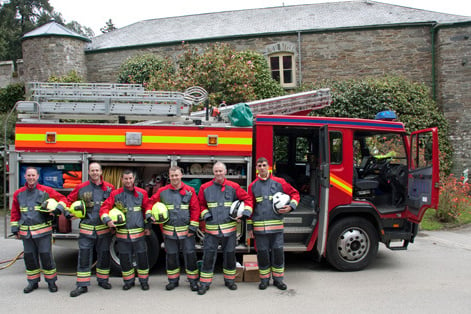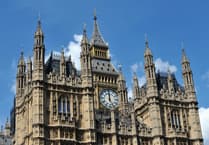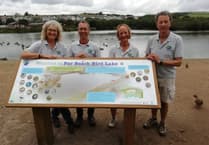A Cornish MP has warned that “countless lives” could be lost if the South West Ambulance Trust goes ahead with plans to stop its long-standing emergency response agreement with Cornwall’s firefighters. The move to increase the roles of volunteer Community First Responders has also been criticised by a Cornwall councillor, who has called for a crisis meeting, and the Duchy’s chief fire officer.
South Western Ambulance Service NHS Foundation Trust (SWASFT) has decided to phase out the fire co-responder role that the Trust has provided in collaboration with fire and rescue services in the region following a review into cost and other issues, including “timeliness of response to patients”.
West Cornwall’s Liberal Democrat MP Andrew George, who is a member of the House of Commons’ Health Select Committee, has warned that countless lives could be lost if SWASFT goes ahead with its decision to cease the long-standing cooperation it’s had with the fire service, which provides early response first aid in hard to reach areas like the Lizard Peninsula.
He said: “This is a wrong decision at the worst possible time. When I was last MP, we had to fight to keep this vitally important service. But at a time when Treliske’s emergency department is constantly overrun and when the NHS managers are openly planning the closure of minor injury units – which could leave Lizard/Helston with just limited hours services at Penzance or Redruth – removing the co-responder service as well will leave residents on the peninsula extremely vulnerable.
“The fire service confirm that co-responders’ actions have ‘saved countless lives’, so, it’s reasonable to conclude that the ambulance trust is aware that ‘countless lives could be lost’ in those difficult to reach locations like the Lizard as a result of their decision to withdraw the service.
“I have written to the trust’s CEO, Dr John Martin, to protest and express my astonishment that this decision appears to have been taken without any consultation and in spite of disagreement from its key partner, Cornwall’s Fire & Rescue Service. Unless I receive a satisfactory response, I will take matters up with the Health Secretary, Wes Streeting.”
Rory Gow, a Lib Dem councillor who represents Mullion and St Keverne, has called for an internal meeting of Cornwall Council next week to respond to the “crisis”. He added: “This decision is a bitter blow to our rural communities. The Lizard Peninsula already faces unacceptable delays in ambulance response times, leaving residents vulnerable in moments of crisis. Our firefighters have stepped up heroically, providing life-saving emergency care with professionalism, determination and compassion. To strip away this vital service is yet another setback for those who rely on it most.
“What’s equally troubling is the lack of meaningful engagement with Cornwall councillors and the communities we represent. Decisions of this magnitude should not be made behind closed doors, leaving local representatives scrambling to respond. This disregard for transparency only deepens public distrust in those responsible for safeguarding our emergency services.
“The fire co-responder scheme has saved countless lives. It is not an optional extra; it is an essential lifeline. Its removal will have real consequences and I will not stand by while our communities are left exposed.”
Cornwall’s Fire & Rescue Service issued a statement saying it has “supported the fire co-responder scheme since its inception in 1996, working alongside South Western Ambulance Service NHS Foundation Trust to provide critical life-saving care in some of our most rurally isolated communities.
“Over the past 29 years of outstanding consistent service to our communities, our co-responding on-call firefighters from community fire stations based in St Keverne, Mullion, St Mawes, Helston, Polruan and St Ives (not presently active), have responded to medical emergencies – particularly in rural and hard-to-reach areas. Their devotion and commitment ensured those in need received timely emergency medical assistance, helping bridge critical gaps in emergency care and saving lives.
“We want to express our heartfelt thanks to every firefighter who has served as a co-responder. Their professionalism, compassion and dedication have made a lasting difference to residents across Cornwall.”
Cornwall’s chief fire officer Kathryn Billing added: “I am disappointed by the decision to cease our co-responding agreement. Our firefighters have provided a consistent, professional community response for nearly three decades. They have done this with passion and exceptional dedication, saving countless lives.
“This is an incredibly sad end to a partnership which I know has made a significant difference to so many in our most rurally isolated communities.”
A spokesperson for the ambulance trust said: “We continually review our 999 response model to ensure we’re delivering a high level of patient care. In recent years we have been developing and strengthening our community first responder (CFR) volunteering model, and now have over 600 volunteer CFRs across the South West. They play a vital role in helping us to respond to 999 calls and deliver emergency care to patients within their local community, often ahead of an ambulance arriving on scene.
“This development means we will be phasing out the fire co-responder role that the trust has provided in collaboration with fire and rescue services and we would like to offer our thanks and gratitude to all fire co-responders who have supported the trust, by providing dedicated patient care, and who are now working with us to manage the change.
“CFRs receive an enhanced level of clinical training to help them to respond to patients. CFRs can, with clinical support from the trust, administer pain relief and discharge patients at scene where an onward conveyance to hospital is not the most appropriate next step for them.
“The cost comparator between a fire co-responder and a SWASFT community first responder is significant, so as part of our responsibility to provide the best possible care to patients, while meeting national expectations for efficiency and value for money, we are investing into increasing volunteers across the South West. We are repurposing the finances to ensure we can provide increased availability within the community through our established CFR scheme.
“As part of the transition, we have invited fire co-responders to train to become CFRs, so they can acquire new skills and continue to help support their local community in a medical emergency. We are also extremely grateful to the fire and rescue services who have volunteered space on their sites for us to undertake local recruitment and training.”
SWASFT has pointed out that there is a significant cost difference between a fire co-responder (£80 per mobilisation) and a community first responder, whose average cost per mobilisation is around £20 when factoring in training, out-of-pocket expenses and uniforms.





Comments
This article has no comments yet. Be the first to leave a comment.